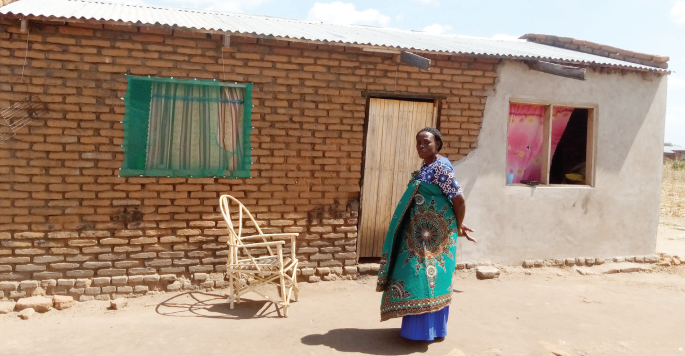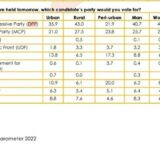The story of 32-year-old Rose Mulenga from Mwayiweyu Village in Senior Chief Mwilang’ombe in Karonga is one of life-changing experience.
Few years ago, her family had nowhere to call home after moving from Chitipa District where they were forced to leave.
Ndovie standing infront of her house she built with money from the programme
They struggled to find a new place to settle, build a house and grow crops.
However, ladyluck smiled at her when her name was included on the list of social cash transfer programme recipients in April 2018 to get K11 000 monthly.
At first, the money was never received for the first five months which accumulated to K55 000. She got a lumpsome.
Mulenga says with the money, she bought a piece of land, a decision she says was hard to make as they also needed to buy food and clothes for children.
She says: “We really could not believe our eyes that all of a sudden, we were able to have that sum of money.
“However, we reminded ourselves how we were treated in Chitipa, but now we have land for farming.”
Mulenga said that was the turning point as the following chunk of money was channelled towards the construction of the house and starting business.
The story is no different from that of Ferida Ndovie of Mchekacheka Village in the same area who is now a proud owner of a three bedroom house which she built with savings from the social cash transfer programme.
The 62-year-old says before she started getting the money, life was difficult.
She says: “I became a widow long time ago. I used to stay in dilapidated house whose ruins are still there. Life was harsh. However, this initiative restored my hope and here I am, I have a house, I bought two goats and I am able to buy fertiliser .”
Another widow, Kolesi Simkonda, 42, has a story similar to Ndovie.
She says:”I am a living testimony of social cash transfer. I used the first lot to buy pigs which I later sold and used the proceeds to buy land where I built a house.
“When I got another lot, I also bought pigs which have multiplied and I intend to sell and begin mobilising resources for the construction of my own house.”
Simkonda says although she is happy with the programme, she wished government had increased the amount to K40 000 to be at par with the current economic situation.
She says: “Much as we are grateful to government for the initiative, living conditions have skyrocketed. Commodity prices have risen which has made life difficult. It would be ideal to adjust the amount to match the living conditions.”
A representative of group village head Mchekacheka, Starson Muchawi, condemned people who use the social cash transfer money on beer.
He says: “Social cash transfer has transformed lives of people in the district. However, there are some who abuse the programme by using the money on things that cannot help their families.
“Instead of investing and saving, they are busy spending the money on beer. But as traditional leaders, we are sensitising them to join village, loans and savings groups.”
The programme is targeting poor households to reduce poverty, and hunger and increase school enrolment.
The programme, which started in 2006, was first implemented as a pilot project in Mchinji District and was subsequently expanded to six districts in 2007.
By September 2017, the programme had reached out to about 777 000 beneficiaries in over 174 500 households across 18 districts, including about 430 000 child-headed families.
In 2018, it was in the country’s 28 districts.
In Karonga, the programme also started the same year and four years down the line, fruits of the interventions are therere for all to see.
According to Karonga district principal social welfare officer Tionge Mbale, the World Bank-funded programme has 7 485 registered beneficiaries.
He says: “The initiative has really borne fruits as most beneficiaries have accumulated assets like houses, livestock, farm inputs and sent their children to school.”
For the smooth and efficient implementation of the programme, Mbale says from July, the paying system has migrated from manual to electronic and government has since partnered with TNM as its service provider to lessen the burden of physical cash transfer to beneficiaries.
“To add value to the initiative, beneficiaries are also venturing in organised Community Savings and Investment Promotion Village Savings and Loan groups to enhance the saving culture,” he says.
Deputy Minister of Gender, Social Welfare and Community Development Agnes Nkusa Nkhoma is happy with the programme.
She says she is particularly impressed that beneficiaries have embraced a saving culture through establishment of loan groups.
Says the deputy minister: “I am impressed with the way many beneficiaries use the money. They have constructed houses, bought fertilizer which others are doing business.
“However, there are few people who do not save. I encourage them to join village savings and loan groups to save their money or invest in businesses.”
According to Nkusa Nkhoma, the programme also aligns itself with the Malawi 2063 development plan which aims at creating an inclusive wealth creation and self-reliance that is anchored on three strategic pillars of agricultural productivity and commercialisation, industrialisation and urbanisation.
The post Social cash transfer: Women’s pin code to economic independence appeared first on The Nation Online.
 Moni Malawi
Moni Malawi 

